Questões de Língua Inglesa do ano 2009
Lista completa de Questões de Língua Inglesa do ano 2009 para resolução totalmente grátis. Selecione os assuntos no filtro de questões e comece a resolver exercícios.
Língua Inglesa - Interpretação de Texto - Centro de Seleção e de Promoção de Eventos UnB (CESPE) - 2009
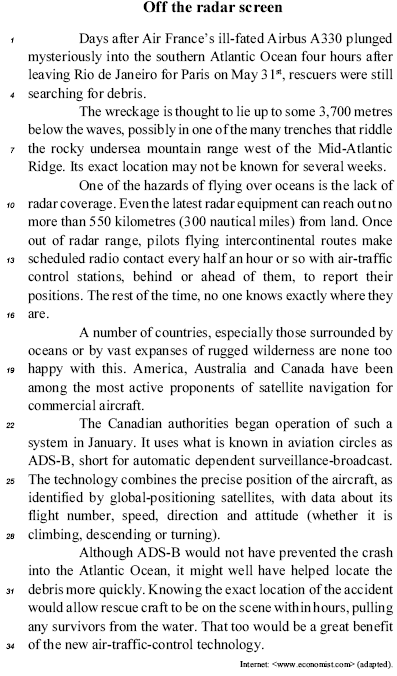
Judge the following items about the ideas and the linguistic structures of the text above.
The word "wreckage" (l.5) refers to the remaining parts of something that has been wrecked.
- C. Certo
- E. Errado
Língua Inglesa - Interpretação de Texto - Centro de Seleção e de Promoção de Eventos UnB (CESPE) - 2009
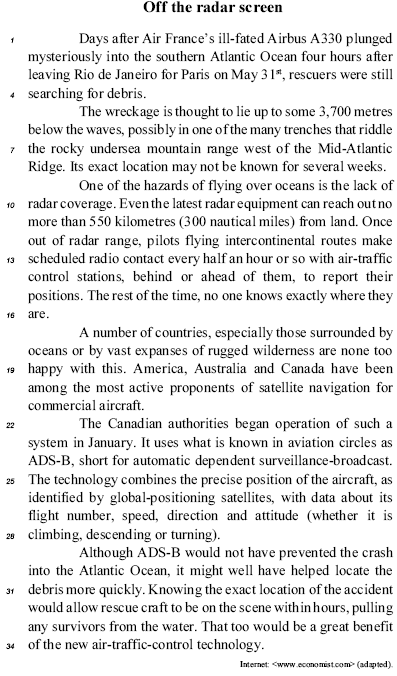
Judge the following items about the ideas and the linguistic structures of the text above.
The wreckage exact location is already known.
- C. Certo
- E. Errado
Língua Inglesa - Interpretação de Texto - Centro de Seleção e de Promoção de Eventos UnB (CESPE) - 2009
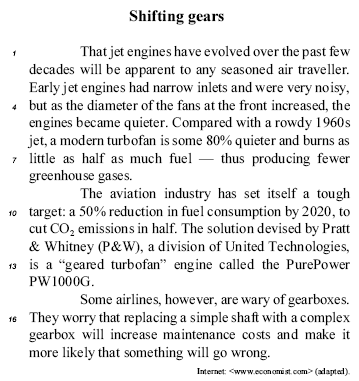
Judge the following items about the ideas and the linguistic structures of the text above.
The aviation industry will have a 50% reduction in fuel consumption by 2020, thus cutting CO 2 emissions in half.
- C. Certo
- E. Errado
Língua Inglesa - Interpretação de Texto - Centro de Seleção e de Promoção de Eventos UnB (CESPE) - 2009
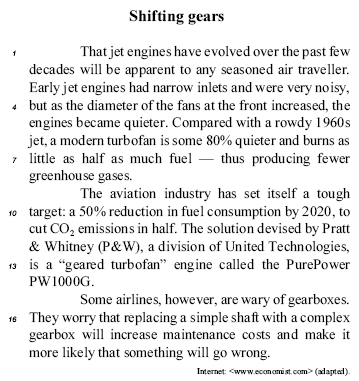
Judge the following items about the ideas and the linguistic structures of the text above.
Besides producing fewer greenhouse gases, a modern turbofan is about 80% quieter than 1960 jets.
- C. Certo
- E. Errado
Língua Inglesa - Interpretação de Texto - Centro de Seleção e de Promoção de Eventos UnB (CESPE) - 2009
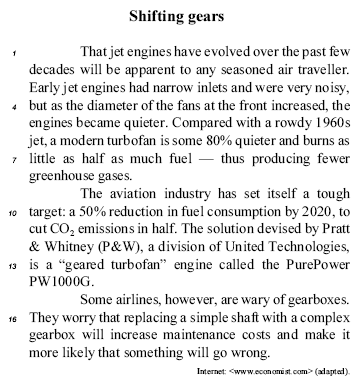
Judge the following items about the ideas and the linguistic structures of the text above.
The word "rowdy" (l.5) is synonymous with quiet.
- C. Certo
- E. Errado
Língua Inglesa - Interpretação de Texto - Centro de Seleção e de Promoção de Eventos UnB (CESPE) - 2009
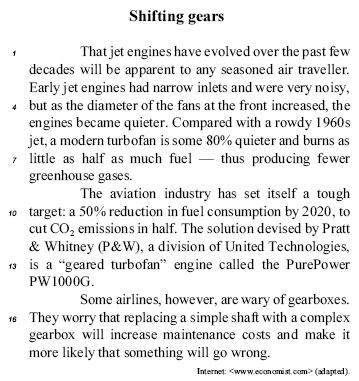
Judge the following items about the ideas and the linguistic structures of the text above.
In "Some airlines, however, are wary of gearboxes" (l.15), "wary" is synonymous with cautious.
- C. Certo
- E. Errado
Língua Inglesa - Interpretação de Texto - Centro de Seleção e de Promoção de Eventos UnB (CESPE) - 2009
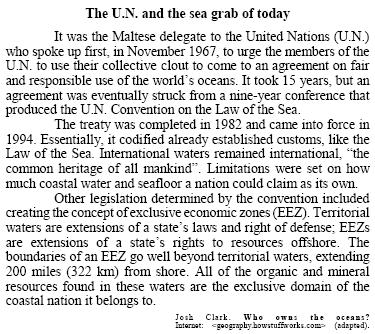
According to the text, judge the following items.
According to the U.N. Convention on the Law of the Sea, the boundaries of an exclusive economic zone exceed territorial waters.
- C. Certo
- E. Errado
Língua Inglesa - Interpretação de Texto - Centro de Seleção e de Promoção de Eventos UnB (CESPE) - 2009
Text for items from 25 through 30
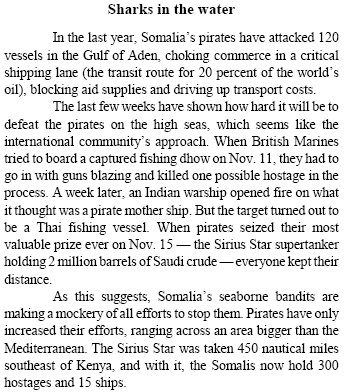
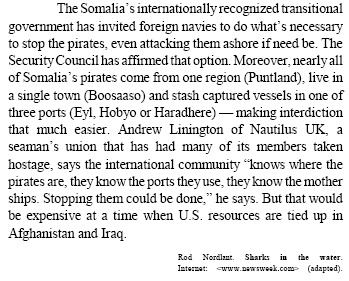
According to the text, it is correct to affirm that
an Indian warship attacked a supposed pirate mother ship which was, nevertheless, a fishing vessel.
- C. Certo
- E. Errado
Your answers to questions 17 to 20 must be based on the article below entitled "Looming water crisis simply a management problem":
Looming water crisis simply a management problem
Source: www.newscientist.com August 20th 2008 (Adapted)
Today´s focus on the credit crisis and rising prices for food and oil has temporarily put another global scarcity in the shade: water. The UN predicts that by 2025, two-thirds of us will experience water shortages, with severe lack of water blighting the lives and livelihoods of 1.8 billion. According to the UN World Water Assessment Programme, by 2050, 7 billion people in 60 countries may have to cope with water scarcity. At this year´s World Economic Forum, UN secretary-general Ban Ki-moon recommended that water scarcity should be at the top of the international agenda. "As the global economy grows, so will its thirst," he said, warning of a future marred by conflicts over water.
There is no doubt that we need to rethink how we use water, especially with the human population growing rapidly, and global warming likely to produce unpredictable patterns of rainfall and drought. Nevertheless, my own research suggests that the situation may not be as dire as many are suggesting. Nations can thrive on surprisingly meagre quantities of fresh water – provided they adopt water-efficient technologies and encourage economic activity that does not guzzle water. I believe the looming water crisis is primarily a problem of distribution and management rather than supply. And we can solve it with existing technologies, increased investment and political will.
In paragraph 1, the author refers to "a future marred by conflicts over water". In other words, a future
- A.
unspoiled by them.
- B.
rid of them.
- C.
clouded by them.
- D.
broadened by them.
- E.
safeguarded by them.
Your answers to questions 17 to 20 must be based on the article below entitled "Looming water crisis simply a management problem":
Looming water crisis simply a management problem
Source: www.newscientist.com August 20th 2008 (Adapted)
Today´s focus on the credit crisis and rising prices for food and oil has temporarily put another global scarcity in the shade: water. The UN predicts that by 2025, two-thirds of us will experience water shortages, with severe lack of water blighting the lives and livelihoods of 1.8 billion. According to the UN World Water Assessment Programme, by 2050, 7 billion people in 60 countries may have to cope with water scarcity. At this year´s World Economic Forum, UN secretary-general Ban Ki-moon recommended that water scarcity should be at the top of the international agenda. "As the global economy grows, so will its thirst," he said, warning of a future marred by conflicts over water.
There is no doubt that we need to rethink how we use water, especially with the human population growing rapidly, and global warming likely to produce unpredictable patterns of rainfall and drought. Nevertheless, my own research suggests that the situation may not be as dire as many are suggesting. Nations can thrive on surprisingly meagre quantities of fresh water – provided they adopt water-efficient technologies and encourage economic activity that does not guzzle water. I believe the looming water crisis is primarily a problem of distribution and management rather than supply. And we can solve it with existing technologies, increased investment and political will.
In paragraph 2, the author says that based on his own research, the situation
- A.
should have been resolved.
- B.
must be promptly addressed.
- C.
could have been hindered.
- D.
may bring about catastrophic shifts.
- E.
might not be so severe.


